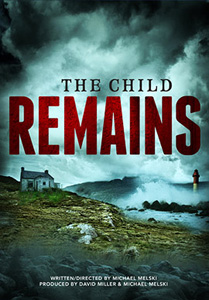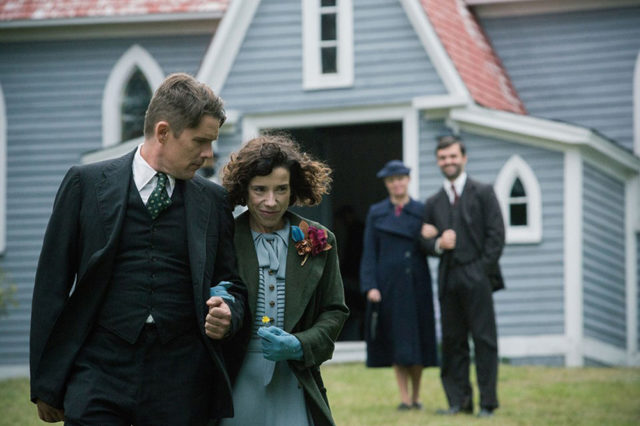2016 – A Year in East Coast Filmmaking
By Stephen Cooke
(January 1, 2017 – Halifax, NS) 2016 could best be described as a year of transition for East Coast filmmakers.
Certainly that’s the case in the Atlantic region’s filmmaking centre of Nova Scotia, as the first full year under the province’s new funding structure draws to a close with decidely mixed reviews.
The cameras did keep rolling on a variety of projects, with a wide range of major TV series, independent features, shorts and documentaries, but the Liberal provincial government’s much-maligned switch from a Film Industry Tax Credit worth nearly $30 million to the local industry to a $10 million incentive fund managed by the province’s Nova Scotia Business Inc. had a discernible effect of casting a grey cloud over future projects. Especially when it comes to attracting larger productions from outside of the region.
“Clearly, the reputational damage, if you will, is probably one of the biggest problems that we suffer from. The loss of confidence is a bit of a problem,” said Scott Simpson, outgoing chair of Screen Nova Scotia, the region’s not-for-profit film and TV industry advocacy and resource organization.
Like many in the industry, Simpson prefers to be cautiously optimistic about the future of filmmaking in the region. While local production was not up to the levels of previous years under the tax credit, it was still better than in 2015, when sudden changes made to film funding without industry consultation threw backers, creators and crew members into a panic.
“There’s no question that people are getting back to work, and a lot of people were working (in the film industry) in 2016, to the point where because we’d also lost crew to other parts of the country due to the changes, it was a struggle for some productions to crew up,” said Simpson. “A lot of more experienced crew, and also younger workers, had gone on to greener pastures.”
The biggest projects on the go in Nova Scotia in 2016 weren’t movies, but rather limited TV series which, by their nature of requiring multiple episodes, keep creators, actors and crew members busier for longer periods of time while providing a bigger boost for the local economy.
Of these, the highest profile project was Spike TV’s The Mist, seeing Nova Scotia once again provide a spooky backdrop for a Stephen King story, as it had in the feature film Dolores Claiborne, the mini-series Bag of Bones and five seasons of the SyFy Channel series Haven.
Inspired by the 2007 Frank Darabont feature film, based on a King novella, The Mist shot 10 episodes in Halifax and Bedford locations, with a cast that includes frequent Spike Lee collaborator Isiah Whitlock Jr and newcomer Gus Birney, along with local veterans like Bill Carr and Darcy Lindzon. If the enduring strength of the King brand and the success of Haven are anything to go by, there’s every indication that The Mist will return in the future once it begins airing in 2017.
The other major new project was the CBC-TV series Pure, created by Nova Scotia-based writer Michael Amo (The Listener) and produced by Two East Productions’ David MacLeod (Call Me Fitz, Haven). Set to begin airing on Jan. 9, 2017, the six-episode series is set amongst a small Mennonite community torn apart by the local drug trade. Along with a large roster of local actors, Pure’s high profile cast members include Oscar® nominee Rosie Perez and Canadian mainstay Peter Outerbridge, with B.C.’s Ryan Robbins (The Killing, Falling Skies) as young pastor Noah Funk, whose faith is tested by this homegrown battle between good and evil.
These two major projects proved to be a boon to an industry hoping to build on mainstays like CBC-TV perennials This Hour Has 22 Minutes and Mr. D, and the international cult phenomenon Trailer Park Boys, now found on Netflix.
Ricky, Julian and Bubbles even expanded on their popularity with an eight-episode spin-off series Trailer Park Boys: Out of the Park, taking their shenanigans on the road to a variety of European locales. Yes, including Amsterdam, where else?
 In the world of feature films, 2016 began with one anticipated project already underway. Sitting on the cusp of the changes to film funding, Michael Melski’s chilly thriller The Child Remains filmed around Windsor, N.S. in December of 2015, before going through post-production in the new year. The writer/director of Growing Op and Charlie Zone completely rewrote the script to accomodate a much smaller budget, but promises acres of atmosphere from historic and rural locations, as well as a strong central performance by Quebec star Suzanne Clement (Laurence Anyways, Mommy).
In the world of feature films, 2016 began with one anticipated project already underway. Sitting on the cusp of the changes to film funding, Michael Melski’s chilly thriller The Child Remains filmed around Windsor, N.S. in December of 2015, before going through post-production in the new year. The writer/director of Growing Op and Charlie Zone completely rewrote the script to accomodate a much smaller budget, but promises acres of atmosphere from historic and rural locations, as well as a strong central performance by Quebec star Suzanne Clement (Laurence Anyways, Mommy).
The first half of 2016 also saw production on The Crescent, a surreal new feature from underground director and musician Seth Smith (Lowlife), and Harry’s Island, a German TV movie about a 75-year-old man who returns to the small island he owns on Nova Scotia’s South Shore, only to find an eccentric, elderly woman squatting there, on the run from a nursing home.
Fall shoots included Cory Bowles’ Black Cop, the first feature from the filmmaker/actor/dancer best known outside of the region for his role on Trailer Park Boys. A hard-hitting satire about an African-Canadian officer who exacts revenge for police brutality against his community, the timely film is based on Bowles’ guerilla-style short film made earlier this year.
Director Jay Dahl sticks with the horror genre of his first feature, There Are Monsters, with his follow-up What Are You Afraid Of (originally titled Halloween Party), shot on Halifax locations in November. The story follows a college student (Goon’s Amy Groening) who must do battle with an internet meme come to life, giving form to the characters’ worst fears.
Meanwhile, a new record for going from the film set to the screen was set by actor/director Koumbi (Mr. D), whose microbudgeted romantic comedy Tristan & Ariyah’s Inevitable Break-Up—co-written with co-star Taylor Olson—was shot in May for just over $1,000 and managed to showcase at the 2016 Atlantic Film Festival in September. It was produced via the same 1KWave Atlantic program that funded Nicole Steeves Dartmouth-shot comedy Head Space, about an agoraphobic summoned to jury duty.
 Both films screened to warm receptions alongside higher profile festival hits like Ashley McKenzie’s harrowing Cape Breton-shot drama Werewolf (which won three AFF awards), and Bruce MacDonald’s lighthearted Weirdos, from a script by Nova Scotia native Daniel MacIvor about two teens hitchhiking around the Cabot Trail in the 1970s.
Both films screened to warm receptions alongside higher profile festival hits like Ashley McKenzie’s harrowing Cape Breton-shot drama Werewolf (which won three AFF awards), and Bruce MacDonald’s lighthearted Weirdos, from a script by Nova Scotia native Daniel MacIvor about two teens hitchhiking around the Cabot Trail in the 1970s.
While it seems local independent productions are pushing ahead in spite of changes in the industry, Screen Nova Scotia’s Simpson says the full effect of those changes has yet to be felt, especially as younger talent tries to break through to the next level after making shoestring-budget debuts.
“As big an issue, or one that’s fallen under the radar, is that there’s no support for local production like there was under the old Nova Scotia Creative Industries banner,” he explains, “where there were development loans and an equity investment program for locally developed films, and travel and marketing support.
“So recent local films like the ones made by Michael Melski and Jay Dahl, and even Werewolf and Weirdos, were projects that had to cut their budgets and work with much more limited resources than they should have, really. That’s basically been the last thing I’ve been working on in my last weeks in this position, is to push for additional support for local films, because it’s currently unsustainable. You can’t make a career by volunteering.”
In the other two Maritime provinces, filmmaking tends to be even more low key and independent, with Prince Edward Island director Harmony Wagner directing her debut Kooperman in 2015, the first feature made entirely within the province, with the help of Telefilm Micro-Budget Production Program funding and Kickstarter, in the absence of any kind of provincial film program or tax credit. In 2016 Wagner told the story of a young deaf girl in her second Periscope Pictures feature Singing to Myself, with the help of a Women in Film and Television-Atlantic/pUNK Films 1KWave Atlantic Award of $1,000.
“Our company is trying to move things forward for P.E.I., we’re actively trying to bring bigger budgets here to the Island and make work for people here, but it takes time,” Wagner told CBC reporter Sara Fraser in May about her decision to work under the tight timeline and restrictive budget of the 1KWave program.
“We have to keep our chops moving forward if we actually want to play the game.”
2016 highlights from New Brunswick included the experimental feature Stripped by writer/director Colleen Furlotte, showing six characters’ emotional journey through “loneliness, lust, shame and despair” and Five, written by Jeffrey Kelley (who also published a simultaneously-penned novel of the story) and directed by Ian Estey and John David Thornton, a locked room mystery with a quintet of men from different branches of the armed forces mysteriously held captive in a room, with one gun containing four bullets.
There was a strong showing from Newfoundland’s film community at the 2016 Atlantic Film Festival in September, with three major features making their debut. Two of them told strong Newfoundland stories, like Justin Oakey’s raw outport family drama Riverhead, and Justin Simm’s Away From Everywhere, based on the Chad Pelley novel about two estranged brothers (played by Shawn Doyle and Jason Priestley) trying to patch up an old feud in a remote rural Newfoundland cabin.

The highest profile film from Newfoundland, and the AFF’s gala opener, was Maudie, about Nova Scotia folk art icon Maud Lewis (played by Sally Hawkins) and her tempestuous relationship with her husband Everett (Ethan Hawke). There was some minor umbrage taken at the fact that Lewis’ story was brought to life in Newfoundland and not in her home province, but the more important story lay in the fact that the East Coast’s biggest feature of 2016 is a triumph for women filmmakers, based on a script by Sherry White, directed by Ireland’s Aisling Walsh, and produced by Mary Sexton, Mary Young Leckie and Susan Mullen.
 In contrast, in Nova Scotia, an excellent piece by filmmaker Paul Kimball points out that while women filmmakers continue to be active in the province, like McKenzie, Koumbie and Steeves, only 0.13 per cent of that $10 million incentive fundwent to a female-controlled company, Jessica Brown’s Fair Game Productions Inc., for the documentary East Coast Fame Game, while McKenzie’s Werewolf was one of five feature films sharing a 6.06 per cent of that pie.
In contrast, in Nova Scotia, an excellent piece by filmmaker Paul Kimball points out that while women filmmakers continue to be active in the province, like McKenzie, Koumbie and Steeves, only 0.13 per cent of that $10 million incentive fundwent to a female-controlled company, Jessica Brown’s Fair Game Productions Inc., for the documentary East Coast Fame Game, while McKenzie’s Werewolf was one of five feature films sharing a 6.06 per cent of that pie.
For his part, Kimball’s own Nova Scotia feature Exit Thread, co-written with Ron Foley MacDonald, was one of 2016’s early East Coast success stories, hitting the international film fest circuit in April, playing at over 40 events from Los Angeles to Barcelona to New Zealand. The dark thriller nabbed 18 awards in the process, including best feature and dramatic film and best actress for Hilary Connell at Detroit’s Trinity International Film Festival.
As the industry braces itself to adjust to the ever-shifting landscape in 2017, especially in Nova Scotia, the full impact of recent funding changes remains unknown, as most of the larger projects that went before the cameras in 2016 had been in development for anywhere from one to five years before finally getting up and running.
“Nobody’s resting easy, thinking that things have turned around or been fixed,” said Simpson. “For the most part, we’ve just climbed back into the van, and we’re trying to make this incentive fund work better that it is right now. It’s being used, and people are mounting productions, and they’re putting money into the industry, but there are still a lot of wrinkles to iron out, as there often are with a new program.
“It could be a lot more efficient, and it’s still in its infancy. I think we can make up some of the ground that we lost with the tax credit, if we can improve the efficiency (of how the fund is administered), and make the prospect of filming here even more attractive.”
![]() Stephen Cooke is an award-winning Halifax-based arts journalist who has been covering the Atlantic scene for three decades. Currently he is on staff at the Nova Scotia news site Local Xpress and also co-hosts the film podcast Lens Me Your Ears with film reviewer and blogger Carsten Knox. This is his first contribution to Northernstars.ca
Stephen Cooke is an award-winning Halifax-based arts journalist who has been covering the Atlantic scene for three decades. Currently he is on staff at the Nova Scotia news site Local Xpress and also co-hosts the film podcast Lens Me Your Ears with film reviewer and blogger Carsten Knox. This is his first contribution to Northernstars.ca


